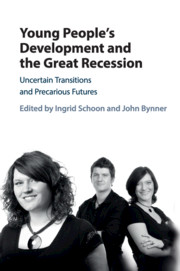Book contents
- Frontmatter
- Contents
- List of Figures
- List of Tables
- Contributors
- Acknowledgments
- Preface
- List of Abbreviations
- Part I Introduction
- 1 Conceptualizing Youth Transitions in Times of Economic Upheaval and Uncertainty: A Life Course Perspective
- Part II The Changing Context of Youth Transitions
- Part III Variations in Education and Employment Transitions during Times of Economic Hardship
- Part IV The Impact of the Great Recession on Families
- Part V Future Orientations and Well-being
- Part VI Conclusion
- Index
- References
1 - Conceptualizing Youth Transitions in Times of Economic Upheaval and Uncertainty: A Life Course Perspective
from Part I - Introduction
Published online by Cambridge University Press: 20 October 2017
- Frontmatter
- Contents
- List of Figures
- List of Tables
- Contributors
- Acknowledgments
- Preface
- List of Abbreviations
- Part I Introduction
- 1 Conceptualizing Youth Transitions in Times of Economic Upheaval and Uncertainty: A Life Course Perspective
- Part II The Changing Context of Youth Transitions
- Part III Variations in Education and Employment Transitions during Times of Economic Hardship
- Part IV The Impact of the Great Recession on Families
- Part V Future Orientations and Well-being
- Part VI Conclusion
- Index
- References
Summary
Introduction
The lives of young people are shaped by the economic circumstances and social contexts in which they live. In 2008 the world banking collapse, brought on by an overheated housing market in the USA and the deluge of “subprime” mortgages, produced a tidal wave of economic consequences for employment and standards of living that have rightly come to be described as the “Great Recession” (Bell and Blanchflower 2011). Although there was much variation between countries and between regions in the way these effects were experienced, a common feature was that the damage was felt especially by young people trying to find their way from education into the labor market and adult employment. The consequences were variable depending on where, when, in what circumstances, and at what age the transition was attempted. But for some young people it would signal an enhanced likelihood of a life course marred by social and occupational exclusion.
While the overall effect of the Great Recession on employment outcomes is well documented (Bell and Blanchflower 2011; Danzinger 2013; Jenkins et al. 2013), there is less attention to variation within and between countries, the diverse pathways taken by young people in navigating a changing economic context, and the ways in which they adjusted to changing circumstances and opportunities. The unique contribution of this book is to bring together evidence from different countries, drawing on comparable and mainly longitudinal data sources to investigate the impact of the Great Recession on the lives of young people and their families and to identify possible leverage for improving the situation of young people today.
The book advances the study of changing youth transitions, by examining both material and psychosocial aspects relevant to a better understanding of the consequences brought on by a sudden economic downturn and rising uncertainty among parents and their offspring on the threshold of adulthood. Key questions to be addressed include: What was the impact of the Great Recession on the education, employment, and family transitions of young people? Who are the winners and the losers emerging from the economic downturn? What was the effect on psychosocial capabilities, health, and well-being? Did these effects differ in different cultural contexts, for different subgroups in the population, and for different age groups? What policy interventions can potentially counteract deleterious effects?
- Type
- Chapter
- Information
- Young People's Development and the Great RecessionUncertain Transitions and Precarious Futures, pp. 3 - 22Publisher: Cambridge University PressPrint publication year: 2017
References
- 2
- Cited by



